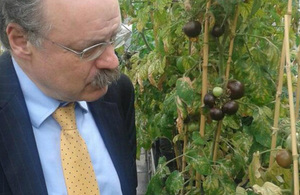Growing our future: plant science to address global challenges and boost UK growth
Plants may be rooted to the spot but, as well as providing聽the food we eat, they can help make leaps in our understanding of the world.

GM purple tomatoes with enhanced levels of the antioxidant anthocyanin.
Sir Mark Walport visited plant and microbial science institute the and other partners on the on 2 May.
He saw cutting edge research to聽protect crops from global crop diseases聽and聽to grow more food more sustainably. He heard about recent advances that allow the production of pharmaceuticals by microbes and plants.
皇冠体育app natural diversity of plants is an important resource for innovation. For example, some wild grasses are resistant to a fungal disease called stripe rust that has caused up to 40% yield losses in large wheat-producing areas across the world. Protecting wheat with fungicides is expensive and environmentally damaging. With researchers from , JIC scientists are instead harnessing natural diversity to develop new resistant wheat varieties adapted to local conditions.

Dr Cristobal Uauy shows Sir Mark varieties of disease-resistant wheat.
Sir Mark learned about new plant breeding technologies including genome editing, where changes to plants can be as small as happens through natural variation and which do not involve introducing any foreign DNA.
He met scientists using GM technology to make crops richer in nutrition and more environmentally sustainable, including Professor Jonathan Jones from , one of the authors of the GM Science Update for the Council for Science and Technology.
Sir Mark Walport said:
皇冠体育app UK is a leading player in all forms of agricultural technology, including GM, and we need to encourage investment and research in this area.
When deciding whether genetic modification is the right technology to use we need to be specific about choosing the right gene,聽in聽the right plant聽for聽the right purpose.
Humans have a long history of genetically modifying crops. Modern bread wheats are a good example聽- they聽were genetically modified through breeding聽which was聽completely uncontrolled and unmonitored. Genetic modification聽by scientists聽is carefully controlled and聽allows聽selection聽of the gene, location and crop.
(Images courtesy of the John Innes Centre. More photographs of the visit are available from our ).